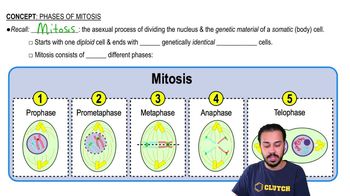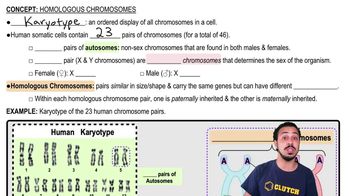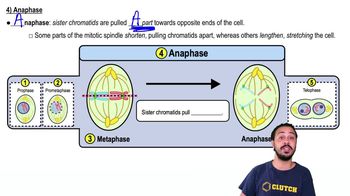Table of contents
- 1. Introduction to Biology2h 42m
- 2. Chemistry3h 40m
- 3. Water1h 26m
- 4. Biomolecules2h 23m
- 5. Cell Components2h 26m
- 6. The Membrane2h 31m
- 7. Energy and Metabolism2h 0m
- 8. Respiration2h 40m
- 9. Photosynthesis2h 49m
- 10. Cell Signaling59m
- 11. Cell Division2h 47m
- 12. Meiosis2h 0m
- 13. Mendelian Genetics4h 44m
- Introduction to Mendel's Experiments7m
- Genotype vs. Phenotype17m
- Punnett Squares13m
- Mendel's Experiments26m
- Mendel's Laws18m
- Monohybrid Crosses19m
- Test Crosses14m
- Dihybrid Crosses20m
- Punnett Square Probability26m
- Incomplete Dominance vs. Codominance20m
- Epistasis7m
- Non-Mendelian Genetics12m
- Pedigrees6m
- Autosomal Inheritance21m
- Sex-Linked Inheritance43m
- X-Inactivation9m
- 14. DNA Synthesis2h 27m
- 15. Gene Expression3h 20m
- 16. Regulation of Expression3h 31m
- Introduction to Regulation of Gene Expression13m
- Prokaryotic Gene Regulation via Operons27m
- The Lac Operon21m
- Glucose's Impact on Lac Operon25m
- The Trp Operon20m
- Review of the Lac Operon & Trp Operon11m
- Introduction to Eukaryotic Gene Regulation9m
- Eukaryotic Chromatin Modifications16m
- Eukaryotic Transcriptional Control22m
- Eukaryotic Post-Transcriptional Regulation28m
- Eukaryotic Post-Translational Regulation13m
- 17. Viruses37m
- 18. Biotechnology2h 58m
- 19. Genomics17m
- 20. Development1h 5m
- 21. Evolution3h 1m
- 22. Evolution of Populations3h 52m
- 23. Speciation1h 37m
- 24. History of Life on Earth2h 6m
- 25. Phylogeny2h 31m
- 26. Prokaryotes4h 59m
- 27. Protists1h 12m
- 28. Plants1h 22m
- 29. Fungi36m
- 30. Overview of Animals34m
- 31. Invertebrates1h 2m
- 32. Vertebrates50m
- 33. Plant Anatomy1h 3m
- 34. Vascular Plant Transport1h 2m
- 35. Soil37m
- 36. Plant Reproduction47m
- 37. Plant Sensation and Response1h 9m
- 38. Animal Form and Function1h 19m
- 39. Digestive System1h 10m
- 40. Circulatory System1h 57m
- 41. Immune System1h 12m
- 42. Osmoregulation and Excretion50m
- 43. Endocrine System1h 4m
- 44. Animal Reproduction1h 2m
- 45. Nervous System1h 55m
- 46. Sensory Systems46m
- 47. Muscle Systems23m
- 48. Ecology3h 11m
- Introduction to Ecology20m
- Biogeography14m
- Earth's Climate Patterns50m
- Introduction to Terrestrial Biomes10m
- Terrestrial Biomes: Near Equator13m
- Terrestrial Biomes: Temperate Regions10m
- Terrestrial Biomes: Northern Regions15m
- Introduction to Aquatic Biomes27m
- Freshwater Aquatic Biomes14m
- Marine Aquatic Biomes13m
- 49. Animal Behavior28m
- 50. Population Ecology3h 41m
- Introduction to Population Ecology28m
- Population Sampling Methods23m
- Life History12m
- Population Demography17m
- Factors Limiting Population Growth14m
- Introduction to Population Growth Models22m
- Linear Population Growth6m
- Exponential Population Growth29m
- Logistic Population Growth32m
- r/K Selection10m
- The Human Population22m
- 51. Community Ecology2h 46m
- Introduction to Community Ecology2m
- Introduction to Community Interactions9m
- Community Interactions: Competition (-/-)38m
- Community Interactions: Exploitation (+/-)23m
- Community Interactions: Mutualism (+/+) & Commensalism (+/0)9m
- Community Structure35m
- Community Dynamics26m
- Geographic Impact on Communities21m
- 52. Ecosystems2h 36m
- 53. Conservation Biology24m
11. Cell Division
Phases of Mitosis
Problem 6`
Textbook Question
Which of the following does not occur during mitosis?
a. Condensation of the chromosomes
b. Replication of the DNA
c. Separation of sister chromatids
d. Spindle formation
 Verified step by step guidance
Verified step by step guidance1
Understand the process of mitosis: Mitosis is the division of a eukaryotic cell's nucleus into two genetically identical nuclei. It consists of several stages: prophase, metaphase, anaphase, and telophase, followed by cytokinesis.
Review the key events of mitosis: During mitosis, chromosomes condense (prophase), the spindle apparatus forms (prophase), sister chromatids separate (anaphase), and the nuclear envelope reforms (telophase).
Recall when DNA replication occurs: DNA replication does not occur during mitosis. Instead, it occurs during the S phase of the cell cycle, which is part of interphase, prior to mitosis.
Analyze the options: a) Condensation of chromosomes occurs during prophase. b) Replication of DNA occurs during the S phase, not mitosis. c) Separation of sister chromatids occurs during anaphase. d) Spindle formation occurs during prophase.
Conclude which event does not occur during mitosis: Based on the analysis, identify that DNA replication (option b) does not occur during mitosis.
 Verified video answer for a similar problem:
Verified video answer for a similar problem:This video solution was recommended by our tutors as helpful for the problem above
Video duration:
45sPlay a video:
Was this helpful?
Key Concepts
Here are the essential concepts you must grasp in order to answer the question correctly.
Mitosis
Mitosis is a process of cell division that results in two genetically identical daughter cells from a single parent cell. It consists of several stages: prophase, metaphase, anaphase, and telophase, during which the chromosomes are condensed, aligned, separated, and finally distributed into the daughter cells.
Recommended video:
Guided course

Phases of Mitosis
Chromosome Condensation
Chromosome condensation occurs during prophase of mitosis, where the chromatin fibers become tightly coiled and folded, making the chromosomes visible under a microscope. This process is crucial for ensuring that the chromosomes can be accurately separated and distributed during cell division.
Recommended video:
Guided course

Homologous Chromosomes
DNA Replication
DNA replication is the process by which a cell duplicates its DNA before mitosis begins, ensuring that each daughter cell receives an identical set of chromosomes. This process occurs during the S phase of the cell cycle, prior to the onset of mitosis, and is not a part of the mitotic process itself.
Recommended video:
Guided course

Introduction to DNA Replication
Related Videos
Related Practice


















